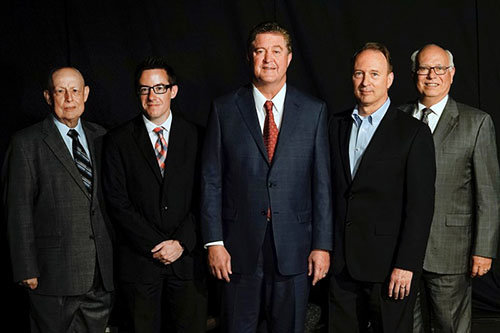 Newly-elected officers of the Southern Baptist Convention, left to right, are Jim Wells, registration secretary; Malachi O'Brien, second vice president; Steve Gaines, president; Doug Munton, first vice president; and John Yeats, recording secretary. The officers were elected Wednesday, June 15 during the annual meeting of the Southern Baptist Convention in St. Louis. ADAM COVINGTON/Special[/caption]
Newly-elected officers of the Southern Baptist Convention, left to right, are Jim Wells, registration secretary; Malachi O'Brien, second vice president; Steve Gaines, president; Doug Munton, first vice president; and John Yeats, recording secretary. The officers were elected Wednesday, June 15 during the annual meeting of the Southern Baptist Convention in St. Louis. ADAM COVINGTON/Special[/caption] ST. LOUIS — Messengers to the Southern Baptist Convention annual meeting June 14-15 witnessed the election of a president (almost) requiring three voting blocks, a call for national revival, discussions on healing the racial rift among believers, and a resolution vote with roots in the birth of the Convention.
Following the first ballot cast Tuesday morning, June 14 North Carolina pastor J.D. Greear held a slim lead over Tennessee pastor Steve Gaines, 44.97 percent of the vote to 44.1 percent, with New Orleans pastor David Crosby garnering 10.08 percent. With no candidate receiving over 50 percent of the vote it was moved to a runoff between the top two vote-getters.
In the runoff 108 votes were deemed “illegal” because the wrong ballot was used or an indistinguishable mark was made, as per Robert’s Rules of Order. Those votes counted in the total which resulted in neither of the two remaining candidates, Gaines and Greear, receiving more than 50 percent of the vote. Gaines, however, was three votes shy of doing so in getting 49.96 percent support.
Prior to the third called vote on Wednesday morning, June 15, Greear and Gaines joined current SBC president Ronnie Floyd at the podium. There speaking from a position of wanting to maintain and promote unity in the Convention, Greear withdrew his name as a candidate thus making Gaines, pastor of Bellevue Baptist Church near Memphis, president.
Outgoing president Ronnie Floyd had promoted the meeting as one cloaked under themes of revival and racial unity. To that end the Convention voted a repudiation of the Confederate flag, hosted a panel of pastors across ethnicities to discuss racial unity in America and featuring Jerry Young, president of the historically African American National Baptist Association USA, Inc., and elected a 2017 Committee on Nominations group that was 25 percent drawn from ethnic minority groups.
An unofficial total of 7,321 registered messengers were at the meeting – up from 5,407 last year – with 11,581 total attendance when guest and exhibitors were included.
SBC chief parliamentarian Barry McCarty, earlier honored for 30 years in that role, said it was the first time in Convention history that it appeared messengers would have to vote between the same two presidential candidates a second time. Recording secretary John Yeats said it had been at least 20 years since a third ballot would be required. The only reason it didn't happen in St. Louis was because of Greear's withdrawal, saying after praying the night before he felt a need for Southern Baptists to "leave St. Louis united."
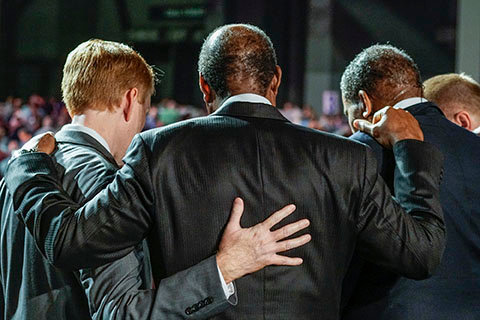 Left to right, Sen. James Lankford (R-Okla.), K. Marshall Williams, president of the National African American Fellowship, and Jerry Young, president of the National Baptist Convention, USA, pray together during the National Call to Prayer for Spiritual Leadership, Revived Churches and Nationwide and Global Awakening at the annual meeting of the Southern Baptist Convention Tuesday, June 14 in St. Louis. MATT MILLER/Special
Left to right, Sen. James Lankford (R-Okla.), K. Marshall Williams, president of the National African American Fellowship, and Jerry Young, president of the National Baptist Convention, USA, pray together during the National Call to Prayer for Spiritual Leadership, Revived Churches and Nationwide and Global Awakening at the annual meeting of the Southern Baptist Convention Tuesday, June 14 in St. Louis. MATT MILLER/SpecialThe Resolutions Committee originally proposed a resolution calling believers "to consider prayerfully whether to limit, or even more so, discontinue its display," but also stating that for some the Confederate battle flag is not "a symbol of hatred, bigotry, and racism."
But former SBC President James Merritt, pastor of Cross Pointe Church in Duluth, moved that the reference to the flag's not being a racist symbol for some be removed and that the convention call believers to "discontinue the display of the Confederate battle flag as a sign of solidarity with the whole Body of Christ, including our African American brothers and sisters."
Messengers adopted Merritt's amendment and the resolution by wide margins after he told the convention support of the flag hinders evangelism among African Americans and said, "Southern Baptists are not a people of any flag. We march under the banner of the cross of Jesus and the grace of God."
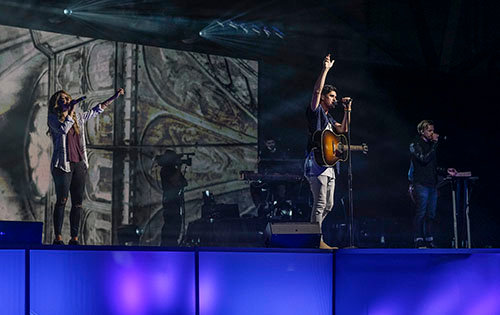 Melodie Malone, Kristian Stanfill, and Brett Younker, members of Passion Band, and members of Johnson Ferry Baptist Church in Marietta, perform during afternoon worship at the 2016 SBC Pastors' Conference Monday, June 13 in St. Louis. BILL BANGHAM/Special
Melodie Malone, Kristian Stanfill, and Brett Younker, members of Passion Band, and members of Johnson Ferry Baptist Church in Marietta, perform during afternoon worship at the 2016 SBC Pastors' Conference Monday, June 13 in St. Louis. BILL BANGHAM/SpecialDuring a nationally televised prayer service that night, Young, of the NBC USA, said the wall of racism "is already down." Hours before the resolution's adoption, Young told Southern Baptists racism in America stems in part from the church's failure to be salt and light. "Somebody needs to pass the salt and turn on the lights," he said.
Young's comments came during the racial unity panel discussion, which also included a multiethnic array of Southern Baptist leaders.
Outgoing SBC President Ronnie Floyd called racism "an assault on the Gospel of Jesus Christ" during his presidential address. He recognized the great great granddaughter of Dred Scott, the slave who was a party to the infamous Supreme Court decision bearing his name. "Any form of racism," Floyd said, "defies the dignity of human life."
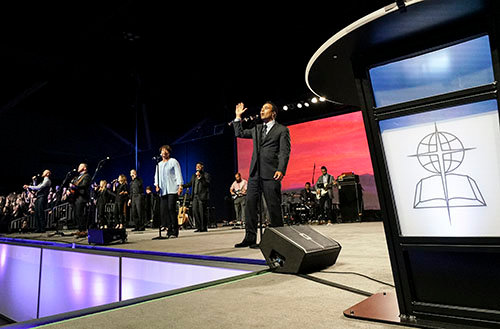 Julio Arriola leads worship during the annual meeting of the Southern Baptist Convention Wednesday, June 15 in St. Louis. MATT MILLER/Special
Julio Arriola leads worship during the annual meeting of the Southern Baptist Convention Wednesday, June 15 in St. Louis. MATT MILLER/SpecialThe Tuesday night "national call to prayer" featured two hours of prayer for awakening in America and around the world. Brief addresses were delivered by a multidenominational team of leaders, including former SBC President Johnny Hunt, Sen. James Lankford of Oklahoma, California pastor and evangelist Greg Laurie, and Young.
A Wednesday afternoon panel discussion considered the role of pastors and churches in American politics. The panel featured five pastors and written comments submitted by Liberty Counsel founder and chairman Mat Staver, who was unable to attend.
During the panel discussion, Jack Graham, pastor of Prestonwood Baptist Church in Plano, TX, said the three most important issues in the 2016 U.S. presidential election are the sanctity of life, religious liberty, and the appointment of Supreme Court justices. K. Marshall Williams, pastor of Nazarene Baptist Church in Philadelphia, said believers should also consider "systemic racism and injustice" as well as "the pipeline from school to prison" among African American males.
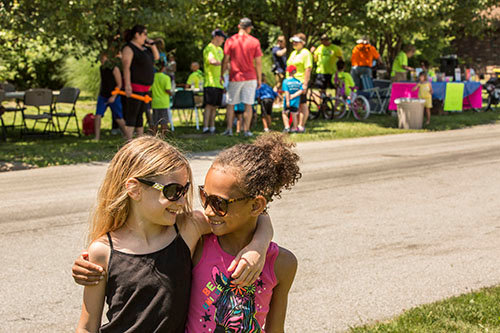 Ava Evans, age 8, (left) and her cousin Kay Harrell enjoy hanging out at a block party hosted by Canaan Baptist Church in Imperial, Mo., on Saturday, June 11. The block party was part of Crossover St. Louis 2016, held prior to the annual meeting of the Southern Baptist Convention June 14-15 at America's Center in St. Louis. CHRIS CARTER/Special
Ava Evans, age 8, (left) and her cousin Kay Harrell enjoy hanging out at a block party hosted by Canaan Baptist Church in Imperial, Mo., on Saturday, June 11. The block party was part of Crossover St. Louis 2016, held prior to the annual meeting of the Southern Baptist Convention June 14-15 at America's Center in St. Louis. CHRIS CARTER/SpecialA resolution adopted by messengers "encourage[d] Southern Baptists and all followers of Jesus Christ in the United States to participate in the democratic process by voting."
On at least three occasions, messengers addressed Muslims' right to build mosques in America.
A motion from the floor asked the convention to remove from their positions Southern Baptist "officers" and "officials" who support Muslims' right to build mosques in America. A separate motion asked the SBC to withdraw its amicus brief in a federal lawsuit involving the Islamic Society of Basking Ridge (N.J.). Both motions were ruled out of order, with the Committee on Order of Business noting the Ethics & Religious Liberty Commission signed onto an amicus brief, not the SBC. The International Mission Board also signed the brief.
During the ERLC report, a messenger asked ERLC President Russell Moore how any Southern Baptists can defend the right to build mosques in light of the fact some Muslims are terrorists. Moore responded that part of "what it means to be a Baptist is to support soul freedom for everyone." The Gospel, not government coercion, is the answer to Islam, he said.
Messengers adopted an Executive Committee resolution of appreciation for Wanda Lee, retiring executive director/treasurer of the Woman's Missionary Union. The resolution noted that during Lee's 16-plus years of service, WMU has helped raise nearly a combined $3 billion for the Lottie Moon Christmas Offering for International Missions and the Annie Armstrong Easter Offering for North American Missions – "which constitutes more than one-half of the total amount raised through these two offerings since they began being reported."
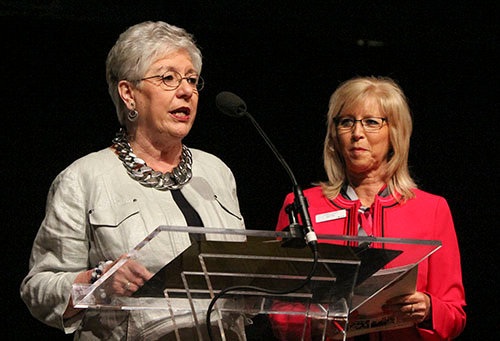 Retiring Woman's Missionary Union (WMU) Executive Director Wanda Lee gives the WMU report with Linda Cooper, president of the national WMU, during the annual meeting of the Southern Baptist Convention Wednesday, June 15 in St. Louis. VAN PAYNE/Special
Retiring Woman's Missionary Union (WMU) Executive Director Wanda Lee gives the WMU report with Linda Cooper, president of the national WMU, during the annual meeting of the Southern Baptist Convention Wednesday, June 15 in St. Louis. VAN PAYNE/SpecialIMB President David Platt reported that following a "difficult" reduction this year of more than 1,000 missionaries, "for 2017, we will be operating with a balanced budged with the stage set for a healthy financial future." He thanked Southern Baptists for a record Lottie Moon Offering for 2015-16, which exceeded the previous high mark by more than $11 million.
North American Mission Board President Kevin Ezell said NAMB planted 926 churches last year. Among all NAMB church plants, one person is baptized annually for every 14 church members. In established churches, the ratio is one baptism per 52 members, Ezell said.
Crossover St. Louis, the convention's evangelistic blitz preceding the annual meeting, yielded 556 professions of faith in Christ as Lord and Savior, the first increase in three years.
In other news:
Additional reporting by David Roach of Baptist Press, newsjournal of the Southern Baptist Convention.